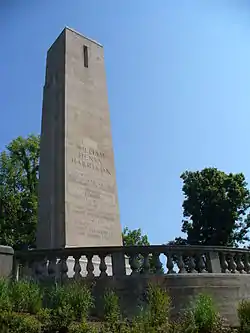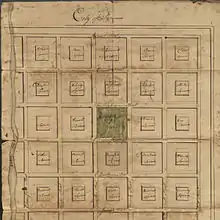North Bend, Ohio | |
|---|---|
 | |
 Location in Hamilton County and the state of Ohio | |
| Coordinates: 39°8′59″N 84°44′45″W / 39.14972°N 84.74583°W | |
| Country | United States |
| State | Ohio |
| County | Hamilton |
| Township | Miami |
| Government | |
| • Type | Mayor-council government |
| • Mayor | Doug Sammons[1] |
| Area | |
| • Total | 1.15 sq mi (2.98 km2) |
| • Land | 1.09 sq mi (2.83 km2) |
| • Water | 0.06 sq mi (0.15 km2) |
| Elevation | 574 ft (175 m) |
| Population (2020) | |
| • Total | 835 |
| • Density | 763.95/sq mi (294.97/km2) |
| Time zone | UTC-5 (Eastern (EST)) |
| • Summer (DST) | UTC-4 (EDT) |
| ZIP code | 45052 |
| Area code | 513 |
| FIPS code | 39-56182[4] |
| GNIS feature ID | 1065159[3] |
| Website | www |
North Bend is a village in Miami Township, Hamilton County, Ohio, United States, along the Ohio River. It is a part of the Greater Cincinnati area. The population was 835 at the 2020 census.
History


North Bend was founded in 1789. It was platted as Symmes City but ultimately never took that name.[5] Instead, it was incorporated as the village of North Bend in 1845.[6] It is named for its location, where the Ohio River meanders to the north.[7]
President Benjamin Harrison was born in North Bend. It was the home of his grandfather, President William Henry Harrison. North Bend is the location of the grave of John Cleves Symmes at Congress Green Cemetery and of the William Henry Harrison Tomb State Memorial, the grave of William Henry Harrison.[8] John Scott Harrison, the only man in U.S. history to be the son of a president and the father of a president, was born in North Bend and is buried in his father's vault in North Bend. Eliza Hendricks, wife of U.S. Vice President Thomas A. Hendricks, also was born in North Bend.
On May 5, 1865, North Bend was the site of an early hold-up of a railway train.[9]
Geography
North Bend is located at 39°8′59″N 84°44′45″W / 39.14972°N 84.74583°W (39.149658, -84.745828).[10]
According to the United States Census Bureau, the village has a total area of 1.15 square miles (2.98 km2), of which 1.07 square miles (2.77 km2) is land and 0.08 square miles (0.21 km2) is water.[11]
Demographics
| Census | Pop. | Note | %± |
|---|---|---|---|
| 1880 | 412 | — | |
| 1900 | 532 | — | |
| 1910 | 560 | 5.3% | |
| 1920 | 597 | 6.6% | |
| 1930 | 597 | 0.0% | |
| 1940 | 679 | 13.7% | |
| 1950 | 711 | 4.7% | |
| 1960 | 622 | −12.5% | |
| 1970 | 638 | 2.6% | |
| 1980 | 546 | −14.4% | |
| 1990 | 541 | −0.9% | |
| 2000 | 603 | 11.5% | |
| 2010 | 857 | 42.1% | |
| 2020 | 835 | −2.6% | |
| U.S. Decennial Census[12] | |||
2020 census
As of the census of 2020, there were 835 people living in the village, for a population density of 763.95 people per square mile (294.97/km2). There were 423 housing units. The racial makeup of the village was 93.4% White, 0.5% Black or African American, 0.8% Native American, 0.0% Asian, 0.0% Pacific Islander, 1.0% from some other race, and 4.3% from two or more races. 0.7% of the population were Hispanic or Latino of any race.[13]
There were 430 households, out of which 28.8% had children under the age of 18 living with them, 62.3% were married couples living together, 9.8% had a male householder with no spouse present, and 25.3% had a female householder with no spouse present. 14.9% of all households were made up of individuals, and 9.8% were someone living alone who was 65 years of age or older. The average household size was 2.46, and the average family size was 2.73.[13]
22.1% of the village's population were under the age of 18, 43.9% were 18 to 64, and 34.0% were 65 years of age or older. The median age was 53.9. For every 100 females, there were 120.0 males.[13]
According to the U.S. Census American Community Survey, for the period 2016-2020 the estimated median annual income for a household in the village was $88,910, and the median income for a family was $103,333. About 11.9% of the population were living below the poverty line, including 26.6% of those under age 18 and 4.2% of those age 65 or over. About 50.6% of the population were employed, and 38.4% had a bachelor's degree or higher.[13]
2010 census
As of the census[14] of 2010, there were 857 people, 370 households, and 278 families living in the village. The population density was 800.9 inhabitants per square mile (309.2/km2). There were 412 housing units at an average density of 385.0 per square mile (148.6/km2). The racial makeup of the village was 97.3% White, 0.6% African American, 0.1% Native American, 0.5% Asian, 0.8% from other races, and 0.7% from two or more races. Hispanic or Latino of any race were 1.2% of the population.
There were 370 households, of which 20.8% had children under the age of 18 living with them, 61.9% were married couples living together, 8.9% had a female householder with no husband present, 4.3% had a male householder with no wife present, and 24.9% were non-families. 21.6% of all households were made up of individuals, and 10.6% had someone living alone who was 65 years of age or older. The average household size was 2.32 and the average family size was 2.63.
The median age in the village was 52.7 years. 15.9% of residents were under the age of 18; 7.3% were between the ages of 18 and 24; 15.8% were from 25 to 44; 37.3% were from 45 to 64; and 23.7% were 65 years of age or older. The gender makeup of the village was 50.1% male and 49.9% female.
2000 census
As of the census[4] of 2000, there were 603 people, 253 households, and 182 families living in the village. The population density was 560.3 inhabitants per square mile (216.3/km2). There were 290 housing units at an average density of 269.5 per square mile (104.1/km2). The racial makeup of the village was 99.83% White and 0.17% African American.
There were 253 households, out of which 28.1% had children under the age of 18 living with them, 58.1% were married couples living together, 8.7% had a female householder with no husband present, and 27.7% were non-families. 24.1% of all households were made up of individuals, and 11.9% had someone living alone who was 65 years of age or older. The average household size was 2.38 and the average family size was 2.80.
In the village, the population was spread out, with 22.2% under the age of 18, 7.3% from 18 to 24, 23.4% from 25 to 44, 31.2% from 45 to 64, and 15.9% who were 65 years of age or older. The median age was 43 years. For every 100 females, there were 93.3 males. For every 100 females age 18 and over, there were 92.2 males.
The median income for a household in the village was $51,979, and the median income for a family was $60,833. Males had a median income of $45,000 versus $26,563 for females. The per capita income for the village was $28,792. About 4.9% of families and 6.5% of the population were below the poverty line, including 10.1% of those under age 18 and 4.5% of those age 65 or over.
See also
References
- ↑ "Village Officials". North Bend, Ohio History and Government. Village of North Bend, Ohio. Retrieved July 23, 2020.
- ↑ "ArcGIS REST Services Directory". United States Census Bureau. Retrieved September 20, 2022.
- 1 2 "US Board on Geographic Names". United States Geological Survey. October 25, 2007. Retrieved January 31, 2008.
- 1 2 "U.S. Census website". United States Census Bureau. Retrieved January 31, 2008.
- ↑ Compton, Harvey Wilson (January 1933). "The Beginnings of Ohio Cities" (PDF). Northwest Ohio Quarterly. The Historical Society of Northwestern Ohio. 1 (5).
- ↑ Hellmann, Paul T. (May 13, 2013). Historical Gazetteer of the United States. Routledge. p. 868. ISBN 978-1135948597. Retrieved November 30, 2013.
- ↑ Knepper, George W. (2003). Ohio and Its People. Kent State University Press. p. 64. ISBN 9780873387910. Retrieved December 2, 2013.
- ↑ Clarke, S. J. (1912). Cincinnati, the Queen City, 1788-1912, Volume 2. The S. J. Clarke Publishing Company. p. 532. Retrieved May 20, 2013.
- ↑ northbendohio.org. "Village of North Bend, Ohio history and government". www.northbendohio.org. Retrieved April 25, 2017.
- ↑ "US Gazetteer files: 2010, 2000, and 1990". United States Census Bureau. February 12, 2011. Retrieved April 23, 2011.
- ↑ "US Gazetteer files 2010". United States Census Bureau. Archived from the original on January 31, 2013. Retrieved January 6, 2013.
- ↑ "Census of Population and Housing". Census.gov. Retrieved June 4, 2015.
- 1 2 3 4 "North Bend village, Ohio - Census Bureau Profile". United States Census Bureau. Retrieved October 21, 2023.
- ↑ "U.S. Census website". United States Census Bureau. Retrieved January 6, 2013.
